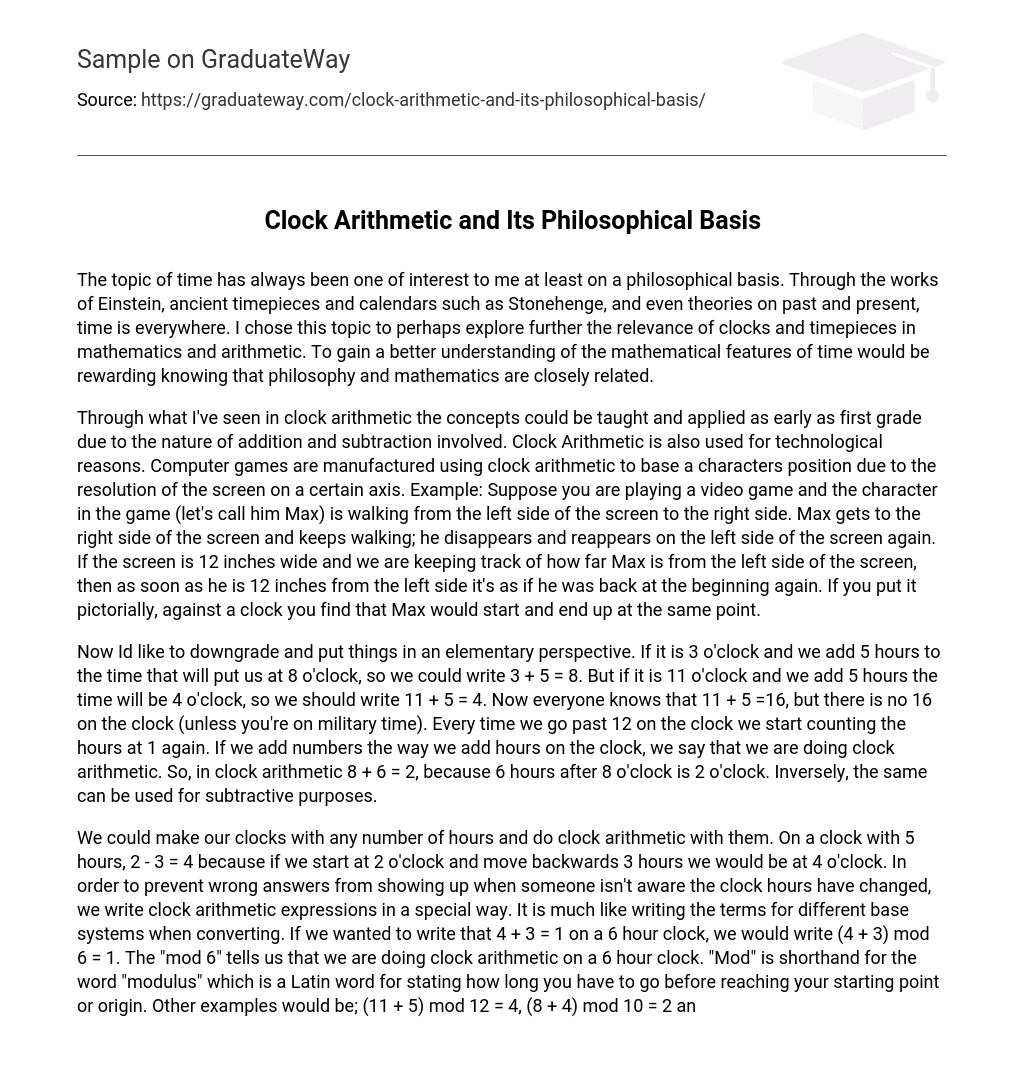The topic of time has always been one of interest to me at least on a philosophical basis. Through the works of Einstein, ancient timepieces and calendars such as Stonehenge, and even theories on past and present, time is everywhere. I chose this topic to perhaps explore further the relevance of clocks and timepieces in mathematics and arithmetic. To gain a better understanding of the mathematical features of time would be rewarding knowing that philosophy and mathematics are closely related.
Through what I’ve seen in clock arithmetic the concepts could be taught and applied as early as first grade due to the nature of addition and subtraction involved. Clock Arithmetic is also used for technological reasons. Computer games are manufactured using clock arithmetic to base a characters position due to the resolution of the screen on a certain axis. Example: Suppose you are playing a video game and the character in the game (let’s call him Max) is walking from the left side of the screen to the right side. Max gets to the right side of the screen and keeps walking; he disappears and reappears on the left side of the screen again. If the screen is 12 inches wide and we are keeping track of how far Max is from the left side of the screen, then as soon as he is 12 inches from the left side it’s as if he was back at the beginning again. If you put it pictorially, against a clock you find that Max would start and end up at the same point.
Now Id like to downgrade and put things in an elementary perspective. If it is 3 o’clock and we add 5 hours to the time that will put us at 8 o’clock, so we could write 3 + 5 = 8. But if it is 11 o’clock and we add 5 hours the time will be 4 o’clock, so we should write 11 + 5 = 4. Now everyone knows that 11 + 5 =16, but there is no 16 on the clock (unless you’re on military time). Every time we go past 12 on the clock we start counting the hours at 1 again. If we add numbers the way we add hours on the clock, we say that we are doing clock arithmetic. So, in clock arithmetic 8 + 6 = 2, because 6 hours after 8 o’clock is 2 o’clock. Inversely, the same can be used for subtractive purposes.
We could make our clocks with any number of hours and do clock arithmetic with them. On a clock with 5 hours, 2 – 3 = 4 because if we start at 2 o’clock and move backwards 3 hours we would be at 4 o’clock. In order to prevent wrong answers from showing up when someone isn’t aware the clock hours have changed, we write clock arithmetic expressions in a special way. It is much like writing the terms for different base systems when converting. If we wanted to write that 4 + 3 = 1 on a 6 hour clock, we would write (4 + 3) mod 6 = 1. The “mod 6” tells us that we are doing clock arithmetic on a 6 hour clock. “Mod” is shorthand for the word “modulus” which is a Latin word for stating how long you have to go before reaching your starting point or origin. Other examples would be; (11 + 5) mod 12 = 4, (8 + 4) mod 10 = 2 and (2 – 3) mod 5 = 4.
It was said that using clock arithmetic in the classroom during the early years of grade school is a very good way to sharpen skills of deduction and perception. And logically it should be used to get children to start learning how to tell time, which is an important skill that will be needed in years to follow. They can also get a good foundation on how to integrate those skills in endeavors to come.
I feel that these ideas are just as important now as they were back when I was in grade school. I felt I learned more than just counting backwards and forwards on small cardboard clocks with plastic hands on them like I did back then. I’m really starting to see a side of mathematics that I never knew about. Its as if I’m getting a behind the scenes look at what goes on beyond the do as I do method that was taught to me all those years.





